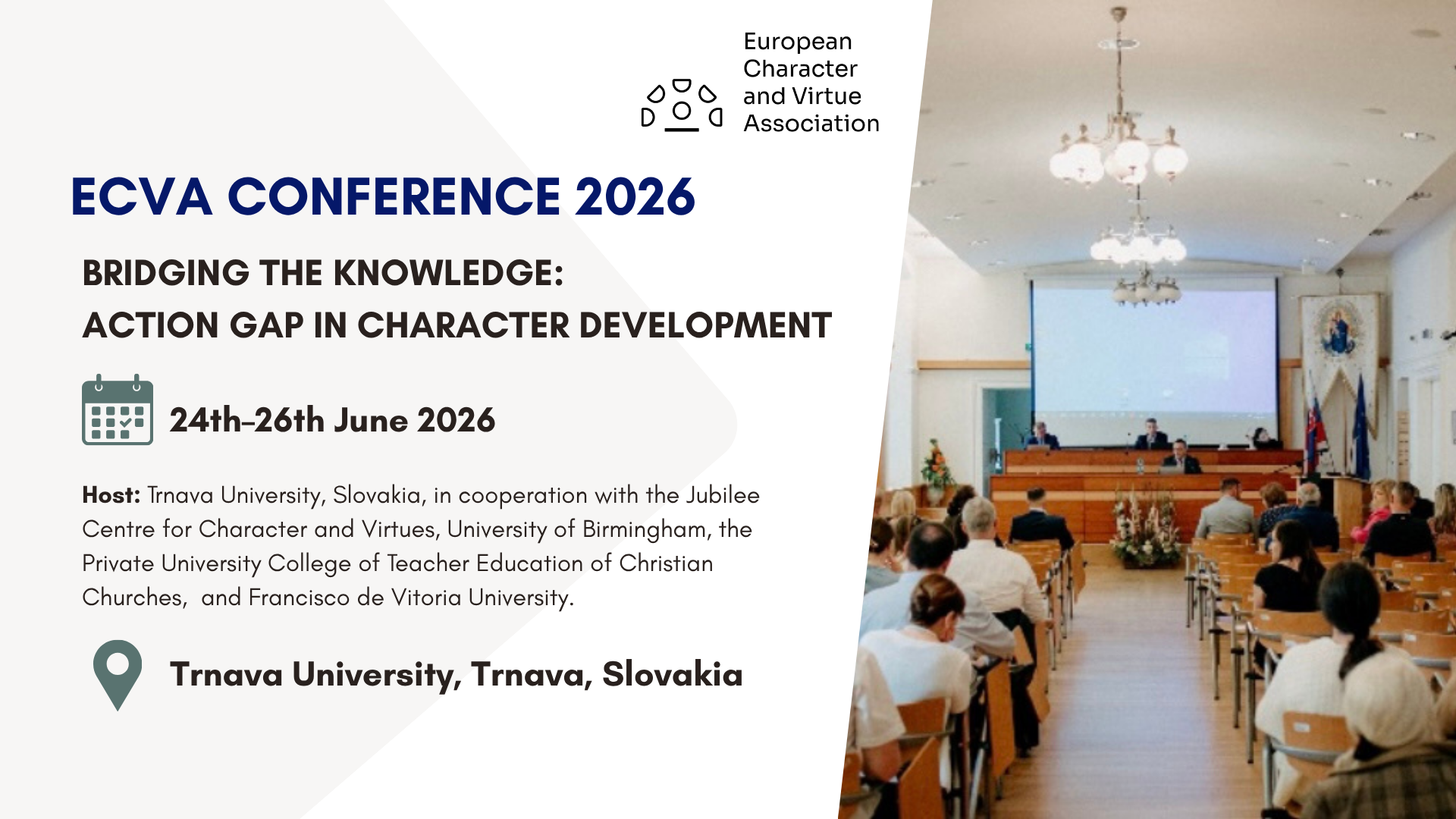
ECVA Character Conference 2026 in Trnava, Slovakia
"Bridging the Knowledge – Action Gap in Character Development"
Established in 2022, the European Character and Virtue Association offers a forum for promoting research, training and networking in the field of character education. We bring together educational institutions in Europe and scholars from around the world, providing unrivalled opportunities for members to share best practices and shape European policies affecting higher education and research.
The 2026 conference of ECVA will take place in Trnava University, Slovakia, in cooperation with the Jubilee Centre for Character and Virtues, University of Birmingham, the Private University College of Teacher Education of Christian Churches, and the Virtues and Values Education Center of Francisco de Vitoria University.
The Executive Board of the European Character and Virtue Association (ECVA) cordially invites you to attend the 2026 ECVA Conference in Trnava, Slovakia.
- President: Prof. Dr. James Arthur (Harvard University)
- Vice President: Prof. Dr. Verónica (Francisco de Vitoria University Madrid)
- Secretary: Prof. Dr. Tom Harrison (Jubilee Centre for Character and Virtues, University of Birmingham)
- Treasurer: Prof. Dr. Roland Bernhard (University of Teacher Education of Christian Churches Austria)
Conference Information
Trnava, Slovakia, 2026, 24th to 26th of June
We expect more than:



Conference description
Bridging the Knowledge – Action Gap in Character Development
Moral education often assumes that ethical knowledge or cognitive competence alone will result in moral behaviour. Yet lived experience, philosophical reflection, and empirical research consistently show otherwise. A persistent gap exists between what individuals know is right and what they actually do—a phenomenon recognized since antiquity.
Aristotle observed that “we reason here not to know what virtue is, but to become good” (Nicomachean Ethics, 1103b), highlighting that moral reasoning is directed toward formation, not just information. Immanuel Kant similarly acknowledged that a person may clearly understand moral duty and yet lack the will to act accordingly, pointing to the human struggle between reason and inclination.
David Hume went further, arguing that “reason is, and ought only to be the slave of the passions,” insisting that moral knowledge without rightly ordered desires lacks the power to move us to action. And Martin Buber wittily adds: “The worst notorious liar in the classroom will write a brilliant treatise on the destructive power of falsehood”.
This enduring challenge – now referred to as the knowledge–action gap – remains a pressing concern across education, psychology, and the social sciences. Scholars have described related phenomena in various conceptualizations, such as the reason–action gap, attitude–behaviour gap, intention–behaviour gap, or the knowledge–attitudes–practice (KAP) gap. Each term reflects a common concern: knowing what is right does not reliably lead to doing what is right.
Bridging this divide is a complex task, compounded by the dynamic, deeply personal, and context-sensitive nature of character formation. Educational and behavioural sciences are increasingly turning to integrative approaches that go beyond cognitive instruction. Interventions such as moral sensitization, dramatization, habit training, and reflective practice are being explored to enhance the coherence between values and actions.
There is growing consensus that this so-called “gappiness problem” cannot be resolved through one-size-fits-all solutions (e.g., moral emotions alone or identity-based interventions). Instead, promising “multi-component” models are emerging that draw on diverse disciplines and methodologies to address the challenge.
Conference Goals
By bringing together interdisciplinary perspectives and diverse methodologies, the ECVA 2026 conference aims to deepen our understanding of the knowledge–action gap and to promote innovative, research-informed strategies for strengthening moral coherence and character development in real-world settings.
We look forward to welcoming those committed to advancing theory-informed practice and practice-informed theory in the service of ethical integrity and flourishing lives.
Call for Abstracts
The European Character and Virtue Association (ECVA) invites submissions for its upcoming conference, taking place in Vienna in 2026. This event, titled “Bridging the Knowledge – Action Gap in Character Development,” will bring together leading researchers, educators, psychologists, philosophers, and practitioners from around the world to explore how character education and life skills development contribute to personal and professional flourishing.
The ECVA 2026 Conference seeks to address key questions at the intersection of character development, resilience, life skills, and competency-building.
We particularly encourage papers that examine:
- Theoretical and conceptual analyses illuminating the roots of moral incoherence and proposing frameworks to bridge moral reasoning and action;
- Empirical studies examining inconsistencies between moral beliefs and behavior;
- Contextual analyses exploring the relationship between personal moral convictions and broader civic or social environments;
- Evaluations of interventions or educational programs that aim to reduce the knowledge–action gap (e.g., action research, experimental studies, formative assessments), or school-based character education initiatives aiming at action;
- Case studies of effective character education models or practices that align ethical understanding with moral behaviour;
- Methodological innovations for assessing coherence between character knowledge and action;
- Curricular analyses on integrating moral and civic education into national, regional, or local education frameworks;
- Teacher-focused research on how educators’ traits and teaching practices influence students’ cognitive-behavioural alignment.
Submissions are invited for paper presentations. All submissions will undergo a review process to ensure quality and relevance. We welcome contributions from researchers, educators, and practitioners who are interested in advancing the study and application of character and virtue education.
The paper proposal is to be submitted in English and must include the following:
- Abstract (500 words), with 4-5 keywords.
- Short abstract (100 words).
- Title of the paper.
- Author(s), affiliation, and e-mail address of the corresponding author.
Deadline for Abstract Submission: 31st of January, 2026.
Notification of Acceptance: 1st of March 2026.
[
